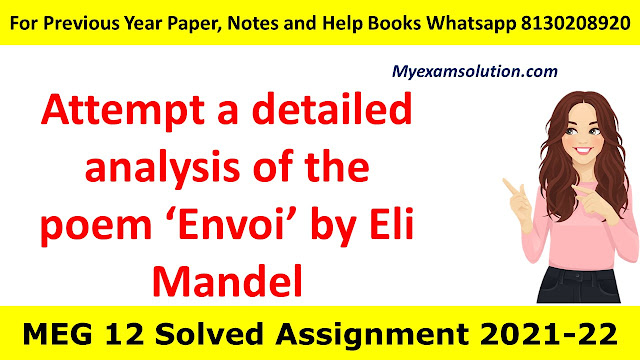Attempt a detailed analysis of the poem ‘Envoi’ by Eli Mandel
Analysis of the poem ‘Envoi’
by Eli Mandel. Eli Mandel (December 3, 1922 – September 3, 1992) was a Canadian
minstrel, editor of numerous Canadian compilations and erudite academic. Analysis
of the poem ‘Envoi’ by Eli Mandel.
Eli Mandel failed in relative obscurity. A
series of strokes had left him unfit to write and, as a result, Mandel had
retreated from public view long before his death.
Analysis of the poem ‘Envoi’
by Eli Mandel. He was born Elias Wolf Mandel in Estevan, Saskatchewan, Canada
to Russian Jewish parents who had emigrated from the Ukraine, and grew up the
Canadian downs during the Great Depression. (2) After a job working for a
druggist who, landed him a position serving in Canada's Medical Corps during
World War II, (3) it has been said Mandel returned a ever emotionally distrait
man who was fated to live the rest of his life without a sense of belonging.
This helps explain the disaffection that's illustrated throughout his jottings.
Analysis of the poem ‘Envoi’ by Eli Mandel.
He studied English at the University of Saskatchewan attaining a Master of Trades degree in 1950. He entered a PhD from the University of Toronto in 1957. Analysis of the poem ‘Envoi’ by Eli Mandel.
From 1953 to 1957 Analysis
of the poem ‘Envoi’ by Eli Mandel., Mandel tutored at the Royal Military
College Saint-Jean. (5) Latterly, he tutored English and creative jotting at
the University of Alberta, University of Victoria, University of Toronto, and
York University. (2) He also tutored Canadian studies at the University of
Calgary.
Besides his poetry, he wrote other critical
workshop similar as his 1969 essay on fellow minstrel Irving Layton.
Analysis of the poem ‘Envoi’ by Eli Mandel.
Write a detailed note on the genre of the Canadian long poem.
What are the major themes present in the novel Surfacing.
Write a detailed note on ‘Naturalism’ and show how it is reflected in the novel ‘The Tin Flute.
Write in detail how modernism and post modernism is reflected in the novel The English Patient.
He was married to his first woman, Miriam
Mandel, for 18 times. The couple had two children, Evie and Charles. In 1967
they disassociated and he married Ann Hardy. They had one child, Sara. Analysis
of the poem ‘Envoi’ by Eli Mandel.
Publishing poetry in the early 1950s, Eli
Mandel's first significant collection was entitled Minotaur runes (1954), and
it appeared in the contact press florilegium Trio (1954).
His poetry was published in
1954 in Trio, an florilegium of runes by Mandel, Gael Turnbull, and Phyllis
Webb published by Raymond Souster's Contact Press.
Analysis of the poem ‘Envoi’
by Eli Mandel. His first book was Fuseli
runes (1960).
His workshop feel to have been deeply told by
World War II, especially all the horrors of the Jewish attention camps. (8)
Despite the lack of direct references to the war until Stony Plain (1973), his
work illustrates numerous grim and morbid images of despair, destruction
written with a tone of necessary pessimism.
Mandel's style was reflective and
intellectual-"an ironic minstrel, rather than an angry bone". (8) The
lack of emotion heightens a hopeless outlook, a central point in all of his
jotting. (8) His early workshop appear to have been written for"a
scholarly rather than public followership"due to their erudite complexity.
(8) In his after work, still, starting with the poetry of Black and Secret Man
(1964), Mandel simplifies the syntax and uses more colloquial language. While
the thoughtful view remained as it was in his earlier work, a jocular tone
replaced the preliminarily dimmed bone.
He was also a critic and
editor, producing a causerie on his fellow- minstrel Irving Layton, and an
florilegium, Poetry62/ Poésie62 (1962), which heco-edited with Jean-Guy Pilon.
Also, he supported numerous else unnoticed beginners of the 1950s similar as Al
Purdy, Milton Acorn,D.G. Jones and Alden Nowlan.
Eli Mandel's book, The Family Romance (1986),
has been characterized by his citations from essays on Hugh MacLennan and
Northrop Frye’s The Great Code. Both extracts illustrate Mandel’s questioning
of whatever is viewed as fallacy. He refuses to let pass what utmost people
simply accept. In this essay collection, it has been honored that the first
piece, Auschwitz and Poetry, is the most important and significant and the last
of this series of essays, The Border League American‘West’and Canadian‘
Region’, seems to be the least successful.
Analysis of the poem ‘Envoi’
by Eli Mandel. The compendium of
Mandel’s work, The Other Harmony the Collected Poetry of Eli Mandel, is a two
volume collection, with the first including Mandel’s benefactions to Trio, as
well has his books Fuseli Runes, An Idiot Joy, Stony Plain, and others. It has
been conceded as the more noteworthy of the two volumes in terms of its primary
material.
Eli Mandel's erudite papers are held by the
University of Manitoba Libraries and Special Collections.
1954 Trio First Runes by
Gael Turnbull, Phyllis Webb, and Eli Mandel. Toronto Contact Press, 1954.
1960 Fuseli Runes
Black and Secret Man. (Toronto Ryerson, 1964)
.1967 An Idiot Joy (Hurtig)
Crusoe Runes Named and New
(Toronto Anansi, 1973)
.1973 Stony Plain (Porcepic)
ISBN 0-88878-010-9
1977 Eschewal Of Place (Porcepic) ISBN
0-88878-074-5
1981 Life Judgment Runes and Journals 1976-1980
2000 The Other Harmony The
Collected Poetry of Eli Mandel, compendium (Canadian Plains Research Centre)
ISBN 0-88977-138-3
. Review
1966 Review The Silent- Speaking Words, Eight
Addresses for CBC Radio (CBC Publications)
.1969 Irving Layton (Forum
House), edited by William French
.1977 Another Time
(Porcepic) ISBN 0-88878-077-X
1986 The Family Romance (Turnstone) ISBN
0-88801-103-2
1981 Featuring Backwards, compendium of
variations from 1954 to 1981
. Muses of Contemporary
Canada, Toronto McClelland & Stewart (New Canadian Library).
2001 Festivity Notorious
Canadian Muses CD Canadian Poetry Association. Analysis of the poem ‘Envoi’ by
Eli Mandel.
